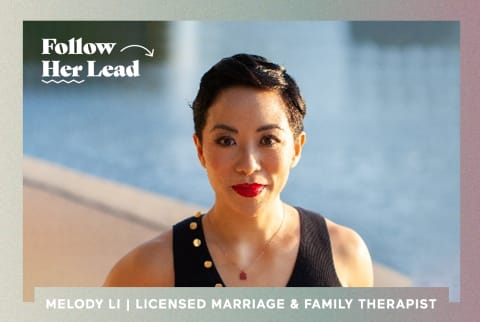Advertisement
A Mental Health Liberation Activist Working For More Inclusive Access To Therapy


After decades of being silenced, ignored, and stigmatized—mental health care is finally getting the spotlight and platform it needs. While the culture is certainly evolving, activist and therapist Melody Li, LMFT—founder of Inclusive Therapists and Mental Health Liberation—is advocating for much more inclusive mental health care practices, to support people of all identities and abilities. Here, Li shares with mindbodygreen why it's crucial to examine and disrupt the current mental health care system so all people can access the healing services they need.
What is your mission, and how are you working toward it at the moment?
People with marginalized identities have disproportionately less access to quality mental health care. This problem is amplified during COVID, in combination with racialized traumas, anti-LGBTQ+ rulings, and migrant crises that compound on our collective well-being. My mission is to reclaim healing for melanated, marginalized, and displaced peoples.
Inclusive Therapists offers a safer, simpler way for people with marginalized identities to connect with culturally responsive, social-justice-oriented mental health services. We center the needs of BIPOC and 2SLGBTQIA+ communities, people with disabilities, and the span of the neurodiversity spectrum.
Stay open to feedback and reflections from those with different lived experiences than you.
We recently launched a sibling nonprofit organization, Mental Health Liberation. Our purposes are:
- Bridging Black, Indigenous and People of Color (BI&POC) with free therapy services
- Empowering future generations of clinicians with marginalized identities
- Dismantling systemic barriers and inequities through policy advocacy and activism
What inspires you most about the work you're doing?
I'm most inspired by the creativity, resourcefulness, imagination, and love that people who have been displaced or colonized embody—and the ways that we channel our ancestral strengths and wisdoms toward collective healing.
Being a queer femme of Color entrepreneur today is only possible because I stand upon the shoulders of activists and advocates that fought before me. It means I have the responsibility to heal from colonial constructs (the -phobias and -isms mentioned above). I am responsible to continue to fight for our collective liberation, prioritizing Indigenous sovereignty and Black liberation.
If you had one piece of advice for readers, what would it be?
Embrace the discomfort. If we are too comfortable, we are not growing. The privilege of comfort not only stifles personal growth, it heightens the risk of us causing harm. Lean into difficult conversations. Engage in critical discourse. Stay open to feedback and reflections from those with different lived experiences than you.
What advice do you have for other women starting out in your career/area of impact?
Find community with folks that you not only share values with but will both uplift and challenge you. We must shift our field away from individualized forms of "care" and toward a shared, collective responsibility to tend to one another's mental wellness. This shift starts with us being willing to be bold to connect with and invest in community.
Who is one woman in your life who never fails to inspire you?
Both of my grandmothers lived very hard lives—they were raised in poverty, were illiterate, and became deaf and disabled. They survived during a colonial era when they were regarded as dispensable. And yet, they channeled their strength, resilience, wisdom, and passion for life through their relationships. They were both deeply loved. I have their flowers tattooed on my arm. In moments of depletion, I draw from them for inspiration, joy, and grit.
This interview has been lightly edited and condensed for clarity.

















